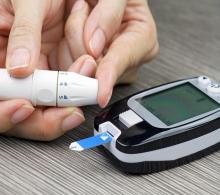
After announcing the expansion of Diabetes Stops Here and asking you which topics you’d like covered, we received a specific request for more information about prediabetes. A staggering 79 million Americans deal with this condition, and while it can lead to crippling health consequences, it can be avoided.
Here are five things you should know about prediabetes:

Just like many kids her age, Bella was eager to attend a summer camp run by the Boys and Girls Clubs of America. When her mother, Nina Paladino, initially contacted the camp facility to see if there were any questions about Bella’s diabetes management, she was assured that everything would be handled. To be certain, Nina sent a follow-up email to the facility, explaining what accommodations were necessary to properly care for Bella. Because she wears an insulin pump, Bella does not regularly require injections prior to meals.


You may have heard of ketoacidosis (DKA). But do you really understand what ketones are and why they happen?


Lynda Jimenez is the Associate Director of Online Strategy & Operations for the American Diabetes Association. This is her story:
Most women begin their journey through pregnancy as soon as those little lines appear. As for me, I started my pregnancy journey eight months before those little lines would make their appearance, an entire year and a half before my son was born.


Don Fillenworth from Bismarck, North Dakota, is 55 years old and lives with type 2 diabetes. This is his success story:


Millions of people around the world live with diabetes or know someone living with diabetes.
Regardless of the type of diabetes, diabetes isn’t yet a curable disease. However, it is a very treatable disease, and no matter how frightening, annoying, and frustrating it can be, people with diabetes can live long, healthy, and happy lives. Our goal is to provide you the information, tools and resources to help make that happen.
An Overview


"What can I eat?" is the #1 question asked by people with diabetes when they are diagnosed. Learn about our nutrition consensus report—and find answers.


Stephen Habbe is the Director of State Government Affairs covering states in the Northeast including Connecticut, Delaware, Maine, Massachusetts, New Hampshire, New Jersey, New York, Pennsylvania, Rhode Island, and Vermont. Prior to joining the ADA, Stephen worked in the Massachusetts Senate where he had the opportunity to collaborate with the ADA on legislation aimed at improving health insurance coverage for people with diabetes.


An estimated 84 million Americans are at risk for developing type 2 diabetes—and someone you love could be among them. However, many people don’t realize that type 2 diabetes can be delayed or even prevented with healthy lifestyle changes. This means that even if your loved ones are at risk for diabetes, there’s still time for them to take the steps necessary to turn their health around.


(NAPS)—Gestational diabetes is something to be concerned about after and not just during pregnancy. Gestational diabetes is diabetes that is found for the first time when a woman is pregnant. If you had gestational diabetes when you were pregnant, you and your child from that pregnancy have a lifelong risk for developing diabetes, a serious disease that can lead to health problems such as heart disease, blindness, kidney disease and amputations.

